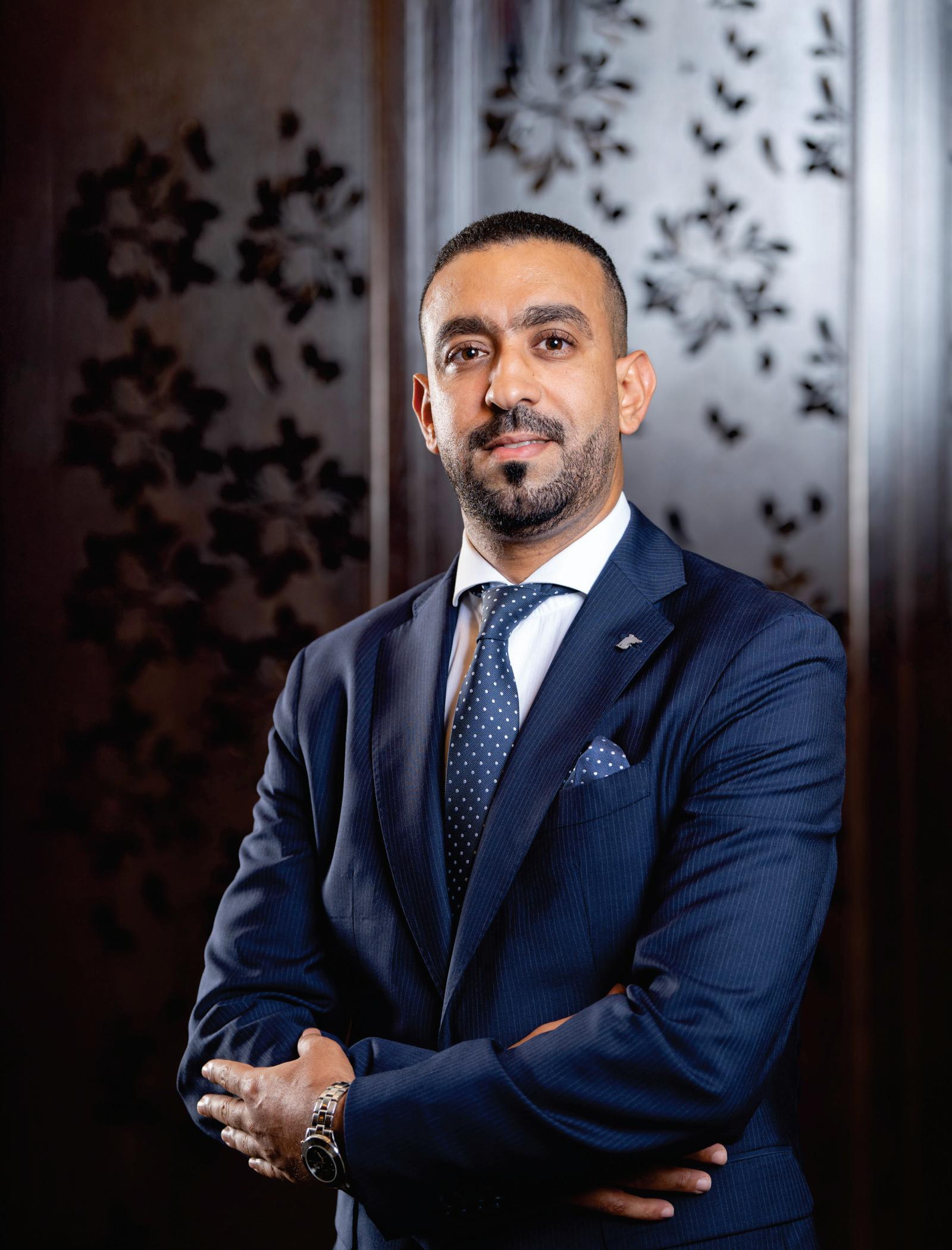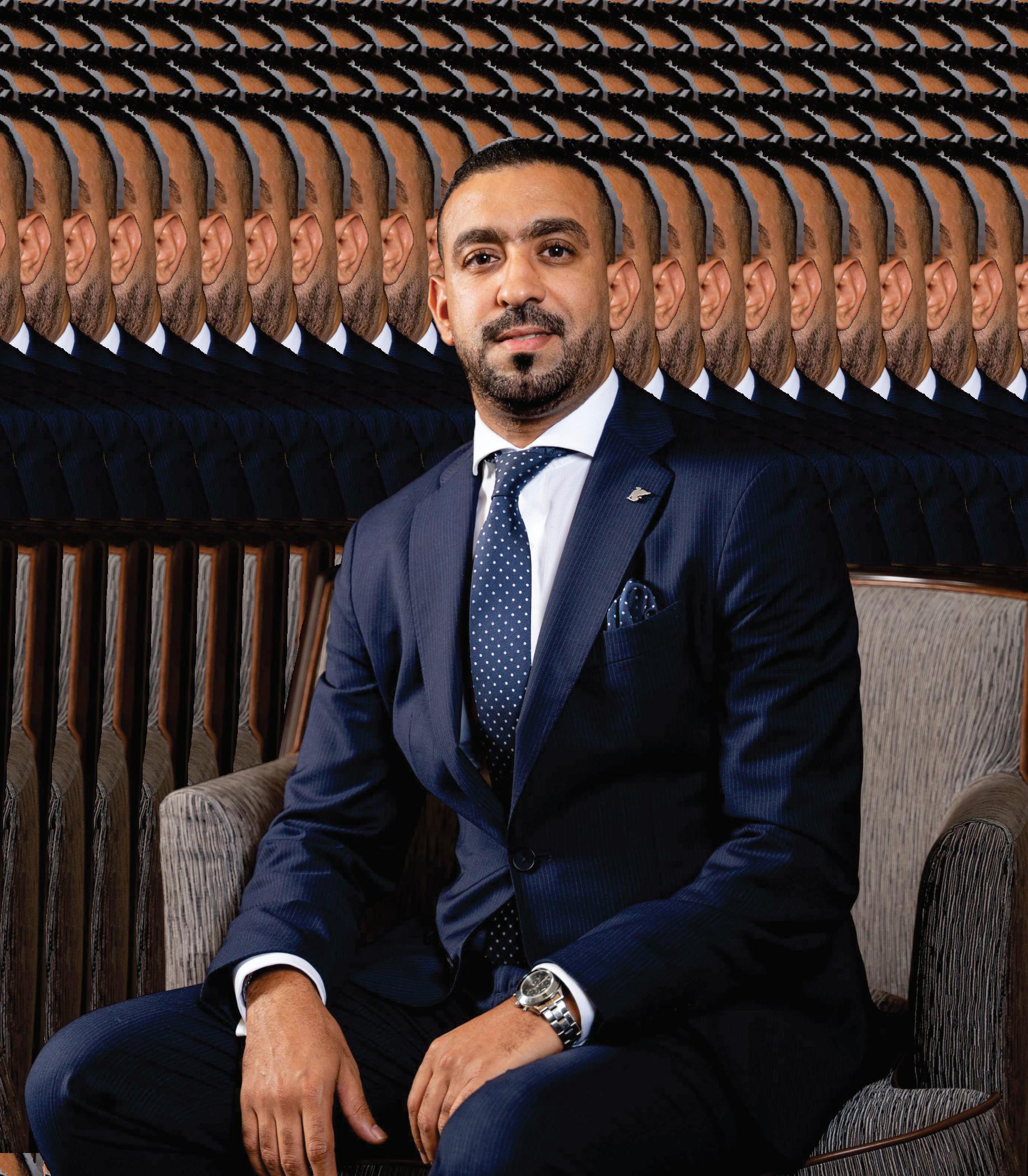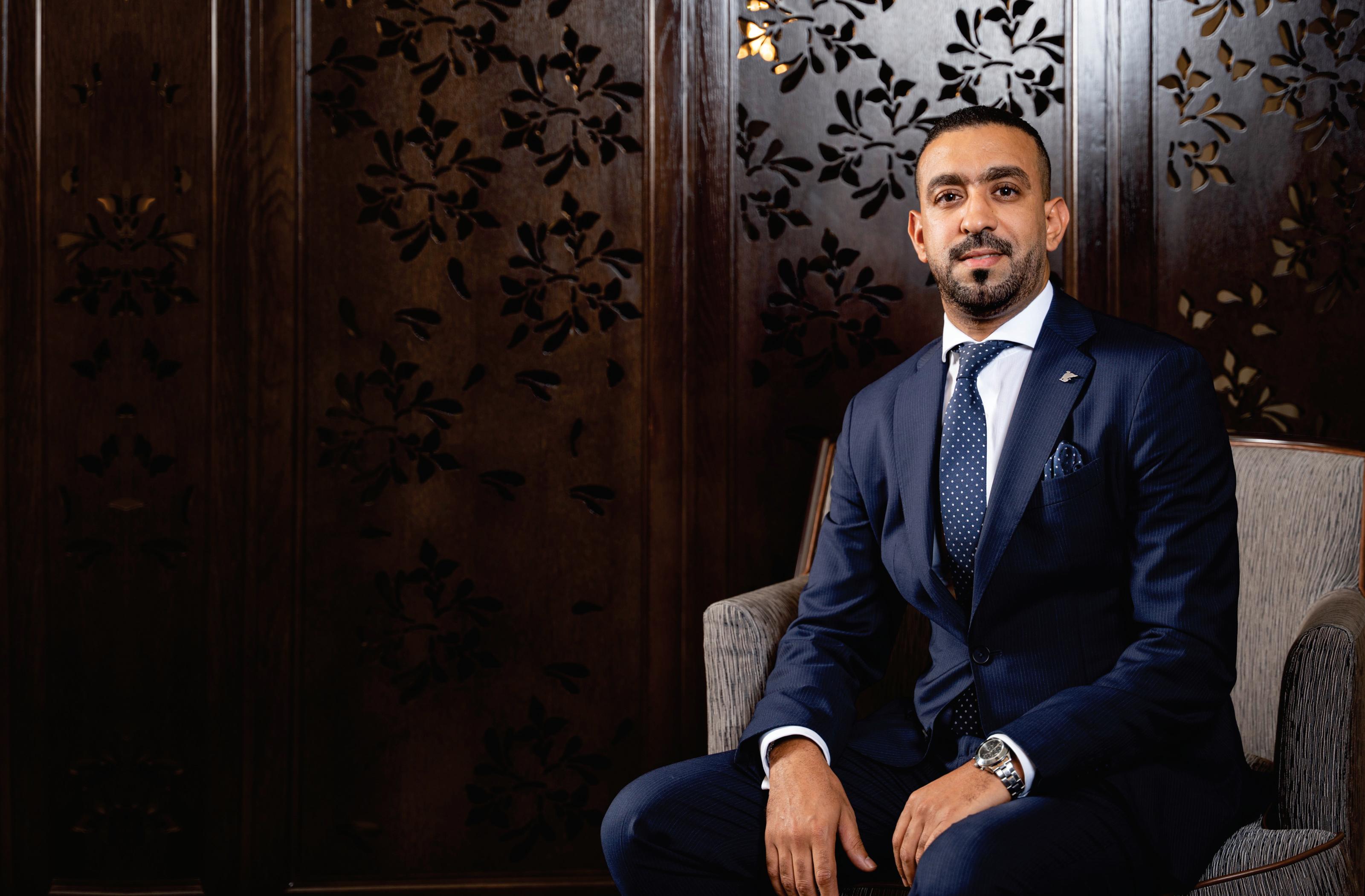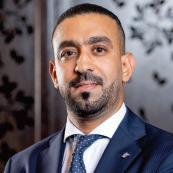














Ineveryera,ahandfulofleadersriseabovetherestnot
onlybecauseoftheirprofessionalachievements,but because of the way they reshape the world around them. In 2025, the essence of leadership is no longer defined by authority alone; it is measured by vision, adaptability, and the ability to create meaningful impact thatresonatesacrossindustriesandcommunities.
This edition of Insights Success titled, Most Transformational Leader Making an Impact in 2025, shines a light on leaders who embody these qualities, individualswhoarenotjustnavigatingchangebutactively driving it. Among them, we proudly feature Said El Moudni, whose journey is a powerful reminder of how transformational leadership can inspire progress, innovation, and unity. Said’s ability to align strategic foresight with human-centric values reflects a new leadership paradigm one that prioritizes sustainability, inclusivity,andlong-termgrowthovershort-termwins.
Aswelookahead,theroleoftransformationalleaderswill only grow more critical. In a world shaped by technological disruption, shifting economic landscapes, andevolvingsocietalneeds,ittakescourageandclarityto steerorganizationsandcommunitiestowardafuturethatis both prosperous and equitable.The leaders recognized in this edition have embraced that responsibility with authenticityandresilience.
It is our hope that the stories within these pages serve as bothinspirationandguidance.Maytheyencourageyouto reflectonthekindofimpactyoustrivetocreate—inyour organization,yourcommunity,andthewiderworld.
Here’stocelebratingthetransformationalleadersoftoday, whoarepavingthewayforabrightertomorrow
HappyReading!

THE SIGNATURE STORY
Said El Moudni Redefining Hospitality Finance with Heart, Vision, and Purpose





A Comprehensive Framework
Developing Next-Generation
Hospitality Finance Leadership

Managing
Art
Business
Business
Digital
Co-designer
Marketing











REDEFINING HOSPITALITY FINANCE WITH HEART, VISION, AND PURPOSE
Director of Finance
JW Marrio� Hotel Muscat




Intherealmofexclusivehospitality,whichtypicallylurks in the shadows behind sparkling silver and marble façades, Said El Moudni has established himself the tasktode-mystifyandfashiontheelaboratemachinerywhich makesitallpossible.Hisowncareer,beginninginMorocco, wherewelcomingguestswasawayofliferatherthanacareer, andcontinuingtothepresentdayasDirectorofFinance,JW MarriottHotelMuscat,isdefinedbyauniquecombination offinancialexpertiseandinterpersonalskills.
His journey has never been quite so straightforward as it seems.Hewasdrawntothemoreprofoundquestionofhow financial planning can support the visitor experience and make possible those who work behind the scenes, while others in his line of work concentrate solely on operational accuracy. With an MBA in economics, significant international qualifications, and an academic background in hotel management from ISEEM El Jadida, he has prepared budgetsforsomeoftheglobe'smostrenownedcompanies.
Otherthannumbers,heisseenasanemergingvoiceofnextgeneration leaders, offering insight on purpose, resilience, and flexibility Leadership, says El Moudni, is more about buildingpotentialthantitles.Hisjourneyisservingasaguide and an invitation to invest in people, lead with honor, and makeideascometolife.
El Moudni's story begins in Morocco, where hospitality wasn'tmerelyaprofession,itwasawayoflifewovenintothe cultural fabric. "Growing up in Morocco, hospitality wasn't just a job; it was life. My family always had guests around, so makingpeoplefeelwelcomefelttotallynatural,"herecalls.
Thisearlyimmersionintheartofhospitalitywouldproveto be the foundation of a career that spans continents and cultures.Buthispathwasn'tconventional.Whilemanyinhis field focus solely on operations, he was drawn to something deeper—thefinancialmechanismsthattransformhospitality dreamsintosustainablerealities.
HisacademicjourneyatISEEMElJadidainMorocco,where he studied Hotel Management, was complemented by an impressivearrayofprofessionalcertifications.TheACCAin International Financial Reporting, GAQM Certified Finance Manager,andGAQMCertifiedFinancialAnalystcredentials speak to a mind hungry for knowledge and precision Currently pursuing his MBA at the University of Woolf in Malta,heembodiestheprincipleoflifelonglearningthathe advocatesforemergingleaders.
What sets El Moudni apart in the competitive world of hospitalityfinanceishisphilosophicalapproachtonumbers. Where others see spreadsheets and profit margins, he sees storiesofhumanconnectionandpotentialfortransformation. "My interest in hospitality finance started with a simple question: how does all the magic behind a great guest experienceactuallywork?"heexplains.
This curiosity-driven mindset led him to a profound realization early in his career: "Finance in this industry is about way more than crunching numbers It's about connecting operations and creativity, and making sure the businesssidehelpsnothindertheguestexperience."
Thisphilosophyhasguidedhisworkacrosssomeofthemost prestigioushotelbrandsintheworld—TheRitz-Carlton,The Ritz-Carlton Reserve, Marriott, Hyatt, and JW Marriott Marquis throughout UAE, Saudi Arabia, Morocco, Qatar, Oman,andacrosstheGCCandAfrica.
El Moudni has carved out a unique niche in the hospitality industry: the complex world of hotel transformations. His specialty lies in the challenging terrain of pre-openings, property conversions, and rebranding projects, the kind of high-stakesfinancialoperationsthatcanmakeorbreakmultimillion-dollarinvestments.


“Success isn't a straight line. It's full of unexpected turns, setbacks, and small wins along the way. Lead with integrity, invest in your people, and stay adaptable. If you focus on creating value for others and keep your eyes open to new possibilities, success will follow.”




“Leadership is about serving, not just steering. Your title? That's just ink on a business card. What really matters is how you show up for your team listening, supporting, guiding. People don't follow titles; they follow leaders who actually care.”
The real turning point in his career came with his first preopening project. Building the financial foundation of a new hotel from scratch proved both daunting and incredibly exciting for him. He enjoyed every aspect of the process—creating budgets, mapping out revenue forecasts, controllingcosts,andultimatelywatchingitallcometogether asaliving,breathinghotel.
His track record speaks volumes: nine hotel pre-openings, twomajorconversions,andahigh-stakesrebranding.Among hismostnotableachievementsaretransformingtheShangriLa Doha into JW Marriott Marquis and converting Hyatt Hotel Apartments into Marriott Executive Apartments projects that demonstrated how strategic financial planning canturnmassivetransitionsintosmooth,profitableventures.
Thenumberstelltheirownstoryofsuccess:a13.9percentage increase to the bottom line at JWMarriott Muscat, reducing pre-opening expenses by $1 million at a prominent hotel in Doha, and consistently managing multi-million-dollar revenuesacrosshisportfolio.
IftherewaseveratestofElMoudni'sleadershipphilosophy, itcameintheformoftheglobalpandemic.AsMulti-Property Financial Controller for three Marriott properties in Doha duringCOVID-19,hefacedwhathedescribesas"atruetest foreveryoneinhospitality."
"I faced extreme drops in revenue and a constant sense of uncertainty Myfocusbecamesimple:keepthebusinessafloat andprotectasmanyjobsaspossible,"herecalls.
But true to his transformational mindset, El Moudni saw opportunity within crisis. "Even in the chaos, opportunities surfaced.Withfewerguests,wefinallyhadthechancetofasttrackmaintenanceprojectsthatwouldhavebeenaheadache atfulloccupancy,settingusupforastrongercomeback."
His pandemic strategy centered on three pillars: aggressive costmanagement,strategicpivotingtonewmarketsegments, andtransparentcommunication.Theteamquicklyadaptedto
attract local business, quarantine stays and extended-stay guests moves that helped stabilize cash flow during the industry'sdarkesthours.
Hereflectedwithsatisfactionthattheyhadn’tjustweathered the storm but had emerged more efficient and resilient.That experience,henoted,hadreinforcedhisbeliefthatintimesof crisis, resilience is just as important as vision in achieving lastingsuccess.
El Moudni's approach to leadership is refreshingly human centered in an industry often dominated by metrics and margins. His management philosophy centers on what he calls "multiplying potential" a concept that goes beyond traditional mentorship to actively creating opportunities for teammemberstoexcelandadvance.
"For me, true leadership is about multiplying potential not just maximizing profits. There's nothing better than watching ateammemberfindtheirconfidenceandshine."heexplains.
Hehasbuiltareputationfordevelopingtalentthatgoesonto leadershiprolesthroughouttheindustry.Speakingaboutthe
personalmessagesofgratitudehereceivesfromformerteam members, he says, "They mean more to me than any official award.They'retherealmeasureofsuccessinmybook."
Hisleadershipstylebalanceshighexpectationswithempathy andpatience.Hesetsthebarhighnotjustforhimself,butfor everyonearoundhim.Whilethisapproachdrivesresults,he has learned to temper expectations with empathy and patience,understandingthatgrowthisaprocessratherthanan instantresult.
Managing the intense demands of hospitality finance while maintaining personal well-being requires what El Moudni calls "rhythm rather than balance." His approach is refreshinglyhonestabouttherealitiesofexecutivelifeinthe 24/7worldofluxuryhospitality.
"Let's not sugarcoat it—hospitality finance is intense. The pace is quick, expectations are high, and if you're not careful, your work will spill over into every corner of your life." he acknowledges.


Hisstrategyinvolvesclearprioritization,effectivedelegation, and leveraging technology to maintain oversight without beingphysicallytetheredtotheoffice."Thesedays,Icankeep tabsonvitalfinancialsfrommyphoneorlaptop.ThatmeansI can step out of the office whether to catch my kids' school activities or just to clear my head without losing touch with whatmatters."
He emphasizes the importance of presence and honesty, statingthatit’saboutbeingpresentbothathomeandatwork when it matters most. Sometimes work takes the lead, and sometimeslifedoes.Thekey,hebelieves,isknowingoneself, being honest in conversations, and having the courage to pausebeforethingsgetoutofhand.
As the hospitality industry continues to evolve in the postpandemic world, El Moudni sees a future where financial leadership must balance technological advancement with human connection. His recent recognition as one of the Global 200 Power Leaders in Finance 2025 by White Page International, alongside his Change Champion Award nominationfromMarriottInternationalEMEA,positionshim asavoiceofauthorityinthistransformation.
"Looking ahead, the leaders who stand out will be those who balance business savvy with genuine human connection. It's tempting to focus only on the numbers, especially as technology and automation ramp up. But in hospitality and, honestly,inlife-relationshipsareeverything,"hecomments.
His message to aspiring leaders is grounded in this philosophy: "Leadership is about serving, not just steering. Your title? That's just ink on a business card. What really
matters is how you show up for your team, listening, supporting, guiding. People don't follow titles; they follow leaderswhoactuallycare."
FromhiscurrentbaseatJWMarriottHotelMuscat,wherehe continues to drive financial excellence while developing the nextgenerationofhospitalityleaders,ElMoudnirepresentsa newbreedoffinancialexecutiveonewhounderstandsthatin the business of creating memorable experiences, the most importantinvestmentisinpeople.
His mantra for success is elegantly simple yet profoundly challenging: "Success isn't a straight line It's full of unexpected turns, setbacks, and small wins along the way Leadwithintegrity,investinyourpeople,andstayadaptable. If you focus on creating value for others and keep your eyes opentonewpossibilities,successwillfollow."
As the hospitality industry continues to evolve, leaders like Said El Moudni are proving that the most sophisticated financial strategies are those that never lose sight of their human purpose. In a world where luxury is increasingly definedbyauthenticconnectionandmeaningfulexperiences, hisapproachtofinanceasatoolfortransformationratherthan merely transaction offers a compelling blueprint for sustainablesuccess.
In the end, El Moudni's story is not just about mastering the complex mathematics of hospitality finance; it's about understandingthatbehindeverynumberisahumanstory,and behindeverysuccessfulhotelisaleaderwhoknowsthatthe most valuable currency is trust, growth, and the potential to transformdreamsintoreality.








Hospitalityhastraditionallybeenareactiveconsumer industry where responsiveness and innovation are paramount The new landscape poses greater financial challenges and opportunities for the hospitality industry than ever before. Global disruption, shifting client habits, and omnipresent digital revolution redefined the traditionalfinanceleadershiprole.
HospitalityFinanceLeadershipisnolongercostandbudget managementitisnowvisionaryleadership,adaptivestrategy, and being able to play financial performance off against customerexperienceandsustainabilitygoals.
Thelastfewyearshaveradicallytransformedthehospitality sector Inflation in operating costs, volatile travel demand, labor deficits, and economic uncertainty have pulled hospitalitybrandsandhoteliersoutofbalance.Thetravelers simultaneously demand more tailored service, seamless digitalexperiences,andvalue-proposition.
Finance leaders are being called increasingly upon to step outsideoffinancialreportingandcompliance.Theyshouldbe strategic business partners, offering insights that inform investment decisions, operation excellence, and customercentricinnovations.ThisisaneweraofHospitalityFinance Leadership where business transformation is driven by financialleaders.
Thefuturehospitalityfinanceleaderswillrequiremorethan technical skills. They require strategic thinking so that they can place the financials into context from a marketplace evolutionandbrandlong-termobjectiveperspective.Noless critical is technology savvy Artificial intelligence, data analytics, and automation are revolutionizing forecasting, pricing,andassetallocation.
Sustainabilityasadifferentiator.Financeleaderstodaymust integrateenvironment,society,andgovernanceintofinancial planningsuchthatresponsibledecision-makingbecomespart of the business model. And lastly, there's emotional intelligence.

Ability to lead teams, facilitate collaboration, and build stakeholder trust is what makes forenhancedHospitalityFinance Leadership as opposed to transactionalmanagement.
Technology is revolutionizing each aspect of hospitality, including the arrival check-in to revenue management systems Digitalization is a threat and a chanceforfinanceleaders.Cloud
accounting, real-time dashboards, and predictive analytics offer the speed and agility for decision-makers to act fast in reaction to changing markettrends.Priceoptimization is easier due to artificial intelligence with analyzing demand patterns, whereas blockchain technology offers greatertransparencytotransactionsandvendorrelationships.
The hospitality finance leadership of the future will entail embracingthesetoolsasinputstodecision-making.Leaders whocanhandledata-driveninputsandhumanjudgmentwill thriveintoday'sfast-pacedworld.
Resilience was the mark of top financial leadership. The pandemic has taught us to build robust risk management frameworks that can weather turbulence. Visionary finance leaders today are obsessed with diversification of revenues, venturing into new growth horizons through well-being products, digital experiences, and co-working spaces in hospitalitysettings.
They are also adopting agile forecasting, where they can quicklyrebaseasaresponsetoenvironmentalshock,andthey are repositioning cost-effective strategies to achieve guest satisfactionsimultaneouslywithmaintainingthecostswithin checks. Here, Hospitality Finance Leadership is not merely short-termfinancialstabilitybutgrowthinthelongrun.
In an effort to foster the next generation of finance leaders, organizationsshouldinvestinleadershipdevelopment.These arecross-functionalexposure,mentorship,andsensitivityto worldwidetrends.Financepersonnelshouldbeencouragedto collaboratecloselywiththeoperations,marketing,andguest relations functions in an effort to cultivate a fully integrated businessmindset.
Nolessimportantisestablishingagrowthmindset.Thefuture cannot be predicted, and leaders must learn to adopt change ratherthanbeafraidofit.Withthedevelopmentofflexibility andresilience,organizationscanempowertheirfinanceteams forthehospitalityfinanceleadershipchallengesofthefuture.
Whereas finance is numbers, it's people for hospitality —employees, guests, and communities. Successful finance leaders must make their finance human once more by connectingfinancialplanswithpeople'swellbeing,customer happiness, and community engagement For instance, investinginemployees'trainingmayappearasacostonthe balance sheet, but it creates long-term worth in terms of increasedretention,levelofservice,andguestloyalty.
Similarly, placing people and visitors first through financial decisionsmakesthemimportant,valued,andrespected.That too is a demonstration of Hospitality Finance Leadership all the time about balance between profitability and human values.
Asthehospitalityindustryevolves,leadershipinfinancewill be asked to assist more and more. Excellent leaders will be those who blend strategic vision, digital disruption, sustainability, and compassion-driven decision-making. Theywilladvocateforprofitabilityastheydesignexceptional guestexperiencesandstrongbusinesses.
Future hospitality finance leadership is not just bottom-line profit—it's knowing how to redefine success on the basis of long-term contribution to employees, stakeholders, and communities. Building the next generation of leaders, the hospitalityindustrycanthriveinanuncertainfuturethatisfull ofpotential.


Hospitality industry remains the most vibrant
segmentoftheglobaleconomy,drivenbycustomer experience,serviceexcellence,andinnovation.Yet, behindthefriendlysmilesandsuperbservicesisthespineof anythrivingbusiness:financialmanagement.
Sustainability and resilience are top priority today, but hospitalityorganizationsmustintegratesustainablestandards of financial management into their operations in order to realizeprofitability,responsiveness,andsocialresponsibility
Sustainablefinancialplanningisnotmerelybudgetbalancing or cost-cutting. It's creating systems of finance that are profitable, but also within overall long-term goals such as resource efficiency, ethics, and shock-resistance to markets. For the hospitality industry, it's visionary planning with consideration towards environmental responsibility and social responsibility and keeping the business financially healthy.
Hotels,resorts,andrestaurantsaresubjecttoindustry-specific challenges—seasonality,highfixedcosts,andvulnerabilityto eventsthatareglobalinnaturelikepandemicsorgeo-political instability With sound financial management in the long term, firms can handle uncertainty better, have stable cash flows, and drive growth without compromise on quality and values.
The importance of financial management in the hospitality industrycannotbeexaggerated.Aprofitabilitycaserelieson correct recording of revenues and expenses, but stability is ensured through long-term security intertwined with shortterm needs. A hotel chain, for example, which invests its capital in green power or minimizing waste will incur additionalcostsintheshortrun,buttheseinvestmentslower operating expenses and enhance its reputation in the consciousnessofgreentravelers.
Furthermore, stakeholders, from investors to customers, are calling for greater transparency and accountability. Organizations that can prove sound financial management will be likely to draw investor confidence, employee commitment, and customer satisfaction Financial sustainability here is no less an issue of competitive advantagethanitisanissueofethicalobligation.
Lying beneath the sustainable finance management in hospitality is some interconnected practice at the core. Dynamicforecastingandbudgetingallowcompaniestoplan for season fluctuation and react rapidly to unplanned variations. Instead of rigid financial plans, firms employing dynamicforecastingsupportedbyanalysisofdatacanendure slowdowns while guaranteeing maximum opportunities duringpeakperiods.

No less important is cost optimization, as opposed to costcutting. Hospitality firms are discovering how to optimize costsinwaysthatbringgreaterefficiencywithoutcomingat the expense of guest satisfaction Energy conservation through energy-efficient lighting, water-saving systems, or locally sourced produce drives down the cost of doing business while also strengthening brand reputation. These types of initiatives demonstrate how cost management can bothimprovebottomlineandplanet.
Responsible investment is also important. Hotel operations usually require serious capital investments in the form of infrastructure, technology, or building human resources Long-term financial planning ensures that investments in them are directed to long-term earnings. Investment, for instance, in green building design or computerized guest service may require up-front expenditure but ultimately translates to increased loyalty from customers and reduced operatingexpenses.
Diversificationofrevenueisthesecondresiliencypillar With all their revenues coming from bookings for restaurants or accommodations alone, hotels are exposed to hard times. Increasingly, hotels nowadays diversify to wellness retreats, virtual experiences, or partnerships with local cultural providers. The additional revenue streams ensure financial healthwhileenhancingthetotalvisitorexperience.
Implementation of technology has transformed the financial operations in the hospitality sector. Cloud accounting, AIdrivenforecasting,andblockchainintegrationaremakingthe operationsmorepreciseandtransparentforthebusiness.Data analytics are supporting guest preferences forecasting and aligning the price strategy, and automation is cutting down administrative expenses and avoiding payroll and procurementerrors.
By incorporating these tools into the financial decisionmakingprocess,hospitalityorganizationsbuildsystemsthat are efficient and enduring. Technology then becomes selftranscendingandnotonlyasourceofprofitabilitybutalsoa sourceofaccountabilityandlong-termsustainability
Financial management is not only just plain numbers on an accounting sheet; it's about being in service to people and saving the planet. Hospitality businesses making business choices on the basis of environment and community values arethechampionsinahecticmarketplace.
Employee training expenditures, reasonable wages, and professional development are all linked favorably with service quality and guest satisfaction. Similarly, corporate investmentsinsustainableprocesses,forexample,alternative power or plastic-free operations, drive reputation and longtermprofitability
This broader vision ensures that financial policy generates a loop of positive impact: returns fund causes within the community and environment, creating loyalty and repeat business.
Even with seemingly obvious benefits, applying sustainable financialmanagementtothehospitalityindustryisnotsimple. Upfront money for greening with technologies or computerized systems could be out of reach for small businesses. In addition, finance managers must create new skillsinsustainabilityreporting,dataanalytics,andissuesof digitalmoneybeyondaccountancyingeneral.Thepressures ofexternalmarketforcefromrecessiontogeopoliticsshocks alsotestthemettleofotherwisebest-stockedfirms.
This requires leadership promise and cultural change with sustainability as organizational DNA. If financial decisions are always made with long-term implications in mind, then companiesarewellpoisedtodealwithuncertaintieswithout compromisingcompetitiveness.
Hospitality'sfutureliesinbalancingonthehighwirebetween profitability and responsibility. The companies that incorporate sustainable financial management into their operations will not only survive crisis and thrive, but also create the foundations for authentic, sustainable guest experiences.Atatimewhentravelersmorethaneverdemand ethicsandtransparency,thosecompanieswillinstilltrustand loyaltyamongallconstituencies.
Hospitalityisactuallyallaboutcreatingexcellentmemories, but ones that must be established on a stable foundation of stability,durability,andaccountability Soundandlong-term financial management is what enables the industry to keep expanding—givingnot just comfortto guests, but also good inthelongruntosocietyandtheworld.





For Subscrip�on: www.insightssuccessmagazine.com
www.x.com/insightssuccess

